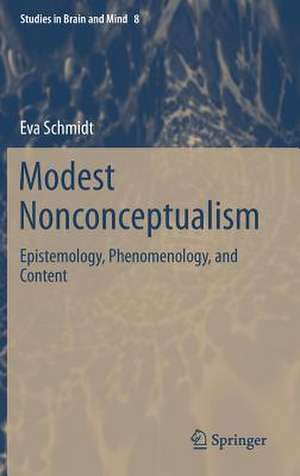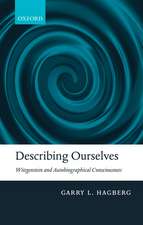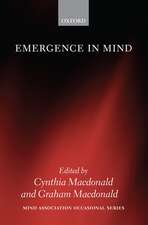Modest Nonconceptualism: Epistemology, Phenomenology, and Content: Studies in Brain and Mind, cartea 8
Autor Eva Schmidten Limba Engleză Hardback – 21 iul 2015
An explication of the notion of nonconceptual content and a distinction between nonconceptualist views of different strengths starts off the volume, then the author goes on to defend participants in the debate over nonconceptual content against the allegation that their failure to distinguish between a state view and a content view of (non)conceptualism leads to fatal problems for their views. Next, she makes a case for nonconceptualism by refining some of the central arguments for the view, such as the arguments from fineness of grain, from contradictory contents, from animal and infant perception, and from concept acquisition. Then, two central objections against nonconceptualism are rebutted in a novel way: the epistemological objection and the objection from objectivity.
Modest Nonconceptualism allows for perceptual experiences to involve some conceptual elements. It emphasizes the relevance of concept employment for an understanding of conceptual and nonconceptual mental states and identifies the nonconceptual content of experience with scenario content. It insists on the possibility of genuine content-bearing perceptual experience without concept possession and is thus in line with the Autonomy Thesis. Finally, it includes an account of perceptual justification that relies on the external contents of experience and belief, yet is compatible with epistemological internalism.
| Toate formatele și edițiile | Preț | Express |
|---|---|---|
| Paperback (1) | 387.38 lei 6-8 săpt. | |
| Springer International Publishing – 15 oct 2016 | 387.38 lei 6-8 săpt. | |
| Hardback (1) | 394.71 lei 6-8 săpt. | |
| Springer International Publishing – 21 iul 2015 | 394.71 lei 6-8 săpt. |
Din seria Studies in Brain and Mind
-
 Preț: 391.22 lei
Preț: 391.22 lei - 15%
 Preț: 645.96 lei
Preț: 645.96 lei - 15%
 Preț: 583.61 lei
Preț: 583.61 lei - 24%
 Preț: 686.51 lei
Preț: 686.51 lei - 15%
 Preț: 699.77 lei
Preț: 699.77 lei - 15%
 Preț: 707.96 lei
Preț: 707.96 lei - 15%
 Preț: 645.47 lei
Preț: 645.47 lei - 15%
 Preț: 643.99 lei
Preț: 643.99 lei -
 Preț: 390.08 lei
Preț: 390.08 lei - 20%
 Preț: 554.05 lei
Preț: 554.05 lei - 15%
 Preț: 578.05 lei
Preț: 578.05 lei - 18%
 Preț: 791.40 lei
Preț: 791.40 lei - 18%
 Preț: 777.03 lei
Preț: 777.03 lei - 15%
 Preț: 646.94 lei
Preț: 646.94 lei - 15%
 Preț: 691.91 lei
Preț: 691.91 lei - 15%
 Preț: 698.80 lei
Preț: 698.80 lei - 15%
 Preț: 641.85 lei
Preț: 641.85 lei - 18%
 Preț: 1118.45 lei
Preț: 1118.45 lei - 15%
 Preț: 639.25 lei
Preț: 639.25 lei - 15%
 Preț: 662.80 lei
Preț: 662.80 lei -
 Preț: 392.21 lei
Preț: 392.21 lei -
 Preț: 394.51 lei
Preț: 394.51 lei
Preț: 394.71 lei
Nou
Puncte Express: 592
Preț estimativ în valută:
75.54€ • 78.57$ • 62.36£
75.54€ • 78.57$ • 62.36£
Carte tipărită la comandă
Livrare economică 14-28 aprilie
Preluare comenzi: 021 569.72.76
Specificații
ISBN-13: 9783319189017
ISBN-10: 3319189018
Pagini: 310
Ilustrații: XI, 268 p.
Dimensiuni: 155 x 235 x 22 mm
Greutate: 0.57 kg
Ediția:1st ed. 2015
Editura: Springer International Publishing
Colecția Springer
Seria Studies in Brain and Mind
Locul publicării:Cham, Switzerland
ISBN-10: 3319189018
Pagini: 310
Ilustrații: XI, 268 p.
Dimensiuni: 155 x 235 x 22 mm
Greutate: 0.57 kg
Ediția:1st ed. 2015
Editura: Springer International Publishing
Colecția Springer
Seria Studies in Brain and Mind
Locul publicării:Cham, Switzerland
Public țintă
ResearchCuprins
1 Introduction.- 2 Content, Concepts, Concept Possession.- 3 Nonconceptual Content.- 4 Arguments from Phenomenology.- 5 The Argument from Contradictory Contents.- 6 Arguments from Concept Possession.- 7 The Epistemological Objection.- 8 The Objection from Objectivity.- 9 Modest Nonconceptualism Vindicated.
Notă biografică
Eva Schmidt is a Research Assistant at the Department of Philosophy at Saarland University, Germany, and a Visiting Lecturer at the University of Luxembourg. Her areas of specialization include philosophy of mind, epistemology, and philosophy of perception. She has published several papers on nonconceptual content and other issues in the philosophy of perception.
Textul de pe ultima copertă
The author defends nonconceptualism, the claim that perceptual experience is nonconceptual and has nonconceptual content. Continuing the heated and complex debate surrounding this topic over the past two decades, she offers a sustained defense of a novel version of the view, Modest Nonconceptualism, and provides a systematic overview of some of the central controversies in the debate.
The volume starts off with an explication of the notion of nonconceptual content and a distinction between nonconceptualist views of different strengths, then the author goes on to defend participants in the debate over nonconceptual content against the allegation that their failure to distinguish between a state view and a content view of (non)conceptualism leads to fatal problems for their views. Next, she makes a case for nonconceptualism by refining some of the central arguments for the view, such as the arguments from fineness of grain, from contradictory contents, from animal and infant perception, and from concept acquisition. Then, two central objections against nonconceptualism are rebutted in a novel way: the epistemological objection and the objection from objectivity.
Modest Nonconceptualism allows for perceptual experiences to involve some conceptual elements. It emphasizes the relevance of concept employment for an understanding of conceptual and nonconceptual mental states and identifies the nonconceptual content of experience with scenario content. It insists on the possibility of genuine content-bearing perceptual experience without concept possession and is thus in line with the Autonomy Thesis. Finally, it includes an account of perceptual justification that relies on the external contents of experience and belief, yet is compatible with epistemological internalism.
The volume starts off with an explication of the notion of nonconceptual content and a distinction between nonconceptualist views of different strengths, then the author goes on to defend participants in the debate over nonconceptual content against the allegation that their failure to distinguish between a state view and a content view of (non)conceptualism leads to fatal problems for their views. Next, she makes a case for nonconceptualism by refining some of the central arguments for the view, such as the arguments from fineness of grain, from contradictory contents, from animal and infant perception, and from concept acquisition. Then, two central objections against nonconceptualism are rebutted in a novel way: the epistemological objection and the objection from objectivity.
Modest Nonconceptualism allows for perceptual experiences to involve some conceptual elements. It emphasizes the relevance of concept employment for an understanding of conceptual and nonconceptual mental states and identifies the nonconceptual content of experience with scenario content. It insists on the possibility of genuine content-bearing perceptual experience without concept possession and is thus in line with the Autonomy Thesis. Finally, it includes an account of perceptual justification that relies on the external contents of experience and belief, yet is compatible with epistemological internalism.
Caracteristici
Contains new and original support for nonconceptualism Offers clear explication of nonconceptual content and nonconceptualism Provides the first systematic book-length presentation of the conceptualism-nonconceptualism debate

















